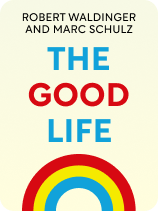

This article is an excerpt from the Shortform book guide to "The Good Life" by Robert Waldinger and Marc Schulz. Shortform has the world's best summaries and analyses of books you should be reading.
Like this article? Sign up for a free trial here.
Do you need to pay better attention to the people in your life? What are some practical ways to improve your relationships?
The Good Life by Robert Waldinger and Marc Schulz discusses tips for improving general relationships in life. They share two things you can do to improve any relationship: Pay better attention and replace bad habits.
Keep reading to learn how to improve your relationships in these two ways.
Action #1: Pay Better Attention
Waldinger and Schulz’s first piece of advice for how to improve your relationships is to pay better attention. In the modern world, our brains have grown accustomed to constant distraction from our devices. As a result, we struggle to maintain our focus on a single thing—including whoever we’re spending time with. This lack of engagement hampers our ability to connect with others.
So how can you pay better attention to the people you’re with? Waldinger and Schulz recommend that you improve your ability to be present in general (and therefore, present with others) by practicing mindfulness. To do so, make it a point in your daily life to spend some time noticing things that haven’t captured your attention before in places you frequent—perhaps the breeze in your office.
Waldinger and Schulz add that you can apply this practice in your relationships: When speaking with someone, ask yourself what you might not be noticing and use that gap to guide your conversation. For example, if a friend is unusually upset about your tardiness, probe a bit deeper—perhaps your chronic lateness is getting on their nerves, or they’re upset because they fought with their mother. Studies indicate that the act of intentionally trying to empathize and connect with others can improve your relationship.
Additionally, Waldinger and Schulz suggest that you minimize the potential damage of your screen use. When using social media, prioritize communicating over browsing; the latter can make you feel worse about your own life because you’re comparing your reality to the highlights that others post online. If you notice that your screen time negatively affects your mood, decrease the time you spend on your devices. Ask the people closest to you whether your screen time bothers them; if so, reevaluate it. Finally, create pockets of time when you don’t check your devices at all so you can focus fully on those who matter most and also evaluate how you feel when you take a break from screens.
Action #2: Replace Bad Habits
Waldinger and Schulz say that you can also improve your relationships by replacing bad relationship habits. They explain that most of us have bad relationship habits; namely, we default to a particular pattern of behavior, or “coping style,” whenever we feel strain. Unfortunately, these defaults can harm us and our relationships; for example, the authors’ research suggests that if you tend to distance yourself from your problems, you won’t be as happy as someone who confronts their problems.
The default pattern, or habit, that you fall into may seem immutable and out of your control. But Waldinger and Schulz explain that in reality, how you handle a particular situation involves a clear process over which you have some control. Whenever you face an external stressor, you feel some way about it and so you respond with a reaction. For example, if your partner is late for your date (stressor), you may feel neglected and react coldly when they finally arrive. This process occurs so quickly that it feels automatic—but if you can interrupt it and choose to behave in a way that strays from your default, you might be able to improve your relationships.
(Shortform note: In The Obstacle Is the Way, Ryan Holiday suggests that understanding the process by which you judge events can improve other aspects of your life, not just your relationships. Unlike Waldinger and Schulz, who focus on how you react to stressors, Holiday suggests that all events are neutral but spark feelings in us that evoke a reaction. According to Holiday, this perspective can help you see the silver lining in anything. For example, if a grandparent dies, you can choose to be sad, but you can also choose to be grateful for the lessons they taught you. Additionally, it helps you see opportunities in problems—which, other experts suggest, could reduce your tendency to avoid problems and thus increase your happiness.)

———End of Preview———
Like what you just read? Read the rest of the world's best book summary and analysis of Robert Waldinger and Marc Schulz's "The Good Life" at Shortform.
Here's what you'll find in our full The Good Life summary:
- That the key to a good life has nothing to do with your career or success
- How to evaluate the current quality of your relationships
- How to improve relationships with your friends, partner, family, and coworkers






